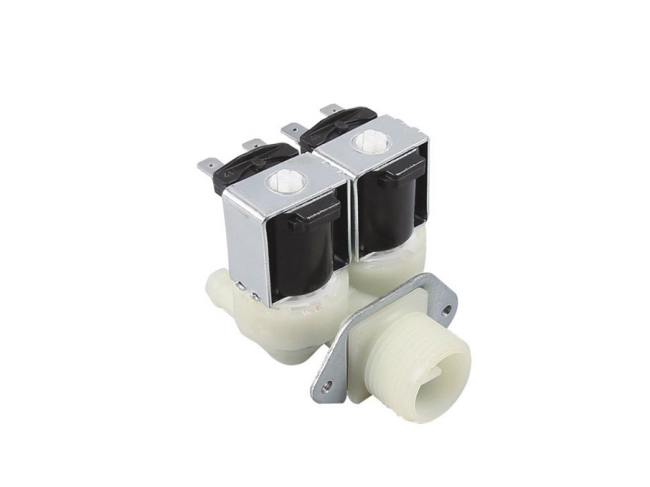1. The function and structure of the inlet valve:
(1) Product description and use The electromagnetic inlet valve is a component used to control the direction and flow of water.
(2) Product structure and working principle The water inlet valve includes a valve body, coil finish, bracket, water inlet, water outlet, back pressure chamber, diaphragm plate assembly, etc. The action of the valve is controlled by the energization and de-energization of the coil.

2. Working principle of the inlet valve:
(1) Initial state: not powered on. The valve core is located on the center hole in the center of the diaphragm plate (the valve core cap plays a sealing role), and the center hole is in a sealed state at one end of the back pressure chamber.
(2) Water inlet: The faucet is turned on and the coil is energized. Water enters the valve chamber through the water inlet and enters the back pressure chamber through the side hole of the diaphragm; the electromagnetic force (the force required to compress the spring) generated by the coil energizes the valve core to disengage from the center hole in the center of the diaphragm, back pressure The water in the room flows to the water outlet through the central hole. Since the hole diameter of the central hole is larger than the hole diameter of the side holes, the water inlet speed in the backpressure chamber will be lower than the water outlet speed, causing the pressure in the backpressure chamber to drop. The pressure of the diaphragm at one end of the valve chamber is greater than the pressure at one end of the back pressure chamber, and the diaphragm is far away from the valve chamber so that the water flows directly from the water inlet to the water outlet.
(3) Shut-off: the coil is de-energized, the magnetic field of the coil disappears, and the spool returns to the initial position due to the force of the spring to block the center hole in the center of the diaphragm. At this time, water can only enter the back pressure chamber through the side hole, and the water in the backpressure chamber cannot flow out from the central hole, causing the water pressure in the backpressure chamber to rise rapidly. When the pressure of the diaphragm at one end of the back pressure chamber is greater than the pressure at one end of the valve chamber, the diaphragm presses against the valve chamber, pressing the valve seat surface, and preventing water from flowing directly from the water inlet to the water outlet.
The above information is provided by the water inlet solenoid valve factory.